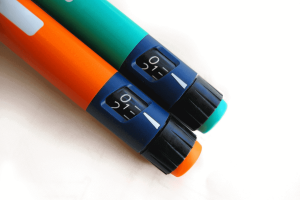Healthy Habits to Kickstart Diabetes Self-Management
Did you know it can take anywhere from 20 to 200 days to make or break a habit?
Make It or Break It
Maybe it’s breaking an unhealthy habit you’ve been avoiding facing. Or maybe you want to start a new habit! Everyone is unique and will need to find what works best for them by consulting their doctor. But here are some great starting points to creating healthier habits when it comes to your diabetes self-management.
Tried-and-True: Testing Your Blood Sugar
The foundation of diabetes management is testing your blood sugar . Having an accurate sugar reading helps determine the best next course of action and puts you in the right direction for the rest of the day. It is recommended to test 3-4 times a day, and any time as needed. A good way to remember to test is to set reminders. This can be done on your glucose monitor or on other devices, like your phone, tablet or smart watch. It’s also helpful to get into a routine and test at the same times everyday. Putting a glucose monitor and test kit by where you eat most meals can help you stick with this routine.
Miss Morning Traffic, Not Morning Meals!
Along with testing regularly, it’s important to eat regularly. This helps both your body and your mind stay on track. It’s easier to remember all of the key elements of self management when there is a routine. Eating on a schedule not only helps you remember to test your blood sugar, but also helps to stabilize it. One of the most frequently skipped meals is breakfast. Breakfast is also one of, if not the, most important meal of the day–especially for people with diabetes!
Sleep on Schedule
Sleeping on a schedule helps regulate your body and gives you extra energy to stay on top of your diabetes management. More often than not, if someone is not getting adequate sleep, they will eat more to make up for their lack of energy, which can then cause a spike in blood sugar levels. If you have trouble sticking with a sleep schedule, there are apps and programs you can try to help regulate your sleep.
Don’t Sweat the Small Stuff
Along with inadequate sleep, stress can really take a toll on your health as well. During stressful times, your body produces an increased amount of hormones to ensure you’ll have enough energy. This causes an increase in stress hormones such as epinephrine, cortisol, and glucagon, which then causes a decrease in insulin. Then a dangerous equation occurs: more sugar + less insulin = high blood glucose. It is very important to try to minimize your stress, so your body isn’t put under that extra pressure.
Here a few ways to avoid extra stress:
-
Get enough sleep
-
Eat a balanced diet
-
Practice yoga/meditation
-
Exercise
-
Journal or talk to someone therapeutically
-
Start a new hobby
-
Spend time with loved ones
-
Pet an animal
-
Listen to or play music
-
Read a book
-
Do something crafty/creative
Visit Your Doctor Regularly
Although we try to be as self-sufficient as we can, managing diabetes can’t be done alone. Doctor visits are crucial for diabetes management. Make sure to schedule regular appointments to test for important health indicators such as A1c, cholesterol (both LDL and HDL), etc. along with regular feet and eye checks.
Summary
Schedules are key! Test your sugars regularly, eat regularly, visit your doc regularly, and sleep regularly. Always make sure to evaluate how you can decrease your stress. We hope these tips help you!
Disclaimer Statement: This is for educational purposes only and not intended as medical advice. For individual medical advice, contact your healthcare practitioner.




